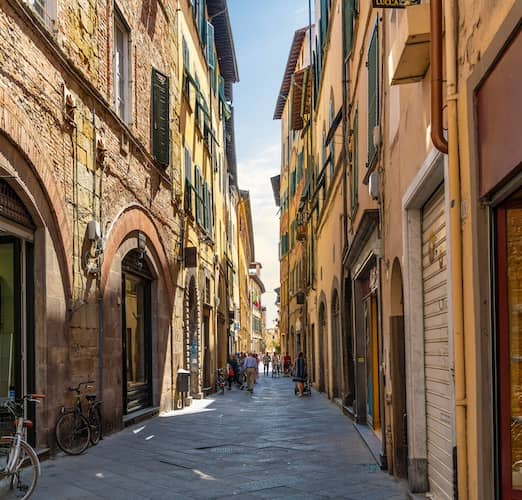A guide to investing in mixed-use properties
Mar 27, 2024
•6-minute read

Home types don’t always fit into neat little boxes. If you reside in a city or some suburbs, it’s not uncommon to live above a business or run one out of your home. An increasingly popular type of real estate investment is mixed-use property. We’ll answer, “What are examples of mixed-use commercial properties?” Rocket Mortgage® doesn’t offer commercial financing, but we offer mixed-use home loans of a primarily residential nature.
What is a mixed-use property?
A mixed-use property is a type of investment property that combines commercial, residential and sometimes even industrial units. This combination of units allows investors to take advantage of different property types in a single investment.
Mixed-use developments often contain complementary properties, like a hotel that also houses retail stores and a gym. It could also include an apartment complex that’s within walking distance of restaurants and local businesses.
These developments are often more convenient and desirable for residents because shops and amenities are within a convenient distance from the complex. From an investment perspective, a multiuse property often generates better long-term performance and creates higher returns on the investment(s).
Types of mixed-use property developments
When you’re investing in a mixed-use development, there’s no limit to the types of properties you can include. Below, we walk through the four main property types you’ll see.
Main street
The main street space is a blend between residential and commercial units in a town's center. This space typically includes residential units within the top floors and commercial spaces on the ground floor. The main street model is one of the oldest and longest-lasting examples of mixed-use real estate.
Live/work
In a live/work space, tenants live and work in the same building. This could look like a business on the ground floor of the building, with apartments located on the top floors. A live/work environment could also include business partners who live adjacent to one another and their workspace.
Residential and office
The residential and office mixed-use property is a blend of office and residential units. This space is primarily a commercial building with multifamily residential units coexisting in the same building.
Mixed-use hotels
A mixed-use hotel typically includes a hotel, fitness center, retail area, cafe or restaurant and an entertainment space. Taking advantage of a mixed-use property in the hotel industry can help increase foot traffic and the hotel's profitability.
What does zoning look like for mixed-use properties?
Mixed-use zoning, also referred to as mixed-use planning, allows for a wider integration of different property types within the same development. These zoning developments usually fall into one of three categories:
- Horizontal: Horizontal developments typically include a variety of single-use properties that offer complementary functions. A horizontal development might have apartments, businesses and retail stores all located within the same block.
- Vertical: Vertical developments contain different types of properties within a single building. For instance, retail stores may be located on the lowest level of the building, with apartments on the top floors.
- Walkable: Walkable developments contain a combination of both horizontal and vertical developments.
Why are mixed-use developments in high demand?
In recent years, there has been a growing demand for mixed-use developments. Here are a few reasons why that’s the case:
- Walkability: One of the biggest benefits of mixed-use developments is walkability. According to the National Association of REALTORS® (NAR), many Americans prefer living in neighborhoods within walking distance of nearby amenities. In particular, millennials prefer living in neighborhoods where they can walk to nearby restaurants and stores.
- Change in consumer behavior: Many people attribute millennials to the growing demand for mixed-use properties. Many millennials who live in urban areas prefer to either walk or use public transportation when getting from one place to another. Over the last decade, many baby boomers have also traded in the suburban lifestyle for mixed-use properties.
- Rising demand for apartments: According to data collected by RentCafe®, over the last 10 years, the number of Americans renting apartments has increased by more than 10%. For those who rent by choice, mixed-use properties provide a more practical use of space.
- Benefits to retailers: Mixed-use developments provide retailers with more foot traffic and greater access to customers than standalone stores.
How to find mixed-use properties for sale
Now that you understand why mixed-use developments are so attractive to investors, how do you find these properties? The most straightforward approach is to search through available market listings.
However, a more strategic way to go about it may be to search for off-market listings. If you have the patience for it, this can often open you up to a larger pool of real estate.
Using off-market listings can also help you cut out the middleman and avoid paying additional fees. Do your research and look for online websites that let you search for both on- and off-market listings.
How To Finance A Mixed-Use Property
If you’re looking to finance things like retail businesses or restaurants with five or more apartments connected, that will require a commercial loan and there are different financing structures. Lenders may ask you for a higher down payment or use different loan structures like debt service coverage ratios. We’re going to focus our discussion on single-family residences.
While residential lenders, like Rocket Mortgage, loan on mixed-use property, it has to be primarily residential in nature. Generally, it must be your main home. For conventional loans, there’s no specific percentage that can be dedicated to the business, but again, it has to be a home first. It also needs to be a single unit. For FHA, the limit on commercial use is 49% of the property. VA has a 25% limit. The area must have residential zoning.
Pros and cons of mixed-use property developments
Like any investing strategy, mixed-use developments come with their share of advantages and disadvantages for property investors. Let’s look at some of the biggest pros and cons you should consider.
Pros
- Diverse tenant market: When you invest in mixed-use property, you’ll often find a more diverse array of tenants. This can lead to more vibrant, interesting communities, which improves the property value of the whole neighborhood.
- Less risk: Thanks to the high demand for mixed-use properties, it tends to be a less risky investment. It can also be considered a safer investment because you’re diversifying your investment across multiple types of properties. By not putting all your eggs in one basket, you won’t lose out on as much income if you lose a tenant.
- Convenience: Because of the easy access to public transportation, shops, work and restaurants, mixed-use properties tend to be more convenient for residents, consumers and investors.
- Sustainable real estate: Mixed-use properties can benefit the environment and are often a more sustainable way to live and work overall. Because the developments are compacted within a denser area, land and other natural resources can be conserved. Plus, the improved walkability reduces pollution since residents likely won’t have to drive as often as they would in places like the suburbs.
Cons
- Can be more complex: Building a mixed-use development that includes shopping, hotels, offices and apartment buildings could be a far more complicated process that takes a year or longer to complete. And if the property is poorly thought out, it could lead to conflicts between the residents and store owners.
- Can be harder to manage: Planning this type of project is more complex, but managing one can be even more challenging. You may need multiple property managers to oversee a single property.
- May involve additional upfront costs: It can be more costly to invest in a mixed-use property. If the properties are unable to draw in new tenants and customers, your profits could be limited.
- Can be difficult to finance: It can be harder to find a lender willing to finance a mixed-use development, especially if you’re operating in a smaller market.
Mixed-use property FAQs
As a real estate investor, you may have more questions about buying mixed-use property developments. Let’s go over some frequently asked questions.
What's the difference between a mixed-use property and a mixed-commercial property?
Mixed-use properties refer to properties intentionally used for a variety of purposes, including commercial, residential, retail and office spaces. For instance, a mixed-use property development could be a combination of an apartment complex, retail stores and businesses located within the same area.
By comparison, a mixed-commercial property is made up of different types of commercial properties. This could look like a mix of office, industrial and retail stores located in the same area.
What’s an example of a mixed-use property?
An example of a mixed-use property development is a single building that houses different types of commercial and residential spaces. For instance, the complex could contain restaurants, stores and office spaces located on the lower level. The top levels could then be used as apartments or condos.
How do I manage a mixed-use property?
Investing in and setting up the property is just the beginning. Once the property is ready, you have to find tenants and manage the property.
You may want to hire an experienced property manager who is well-versed in dealing with both residential and commercial tenants. You’ll also want to know your local regulations and zoning laws to avoid issues with the property down the road.
The bottom line: Mixed-use properties can help diversify your investment portfolio
A mixed-use investment property can be a big commitment, but there are many benefits to investing in one. As an investor, it’s possible that you’ll bring in a higher return on your investment. By investing in mixed-use developments, you’re also helping to build more sustainable and environmentally friendly communities.
Whether you’re a novice or experienced real estate investor, Rocket Mortgage can help you on the home buying journey. While we don’t currently offer financing on commercial real estate, we can provide guidance if you’re interested in single-family, multi-family and other types of investment properties.
Are you ready to get started? Fill out an application with Rocket Mortgage today.

Jamie Johnson
Jamie Johnson is a Kansas City-based freelance writer who writes about a variety of personal finance topics, including loans, building credit, and paying down debt. She currently writes for clients like the U.S. Chamber of Commerce, Business Insider, and Bankrate.
Related resources
6-minute read
Should I pay off my mortgage or invest?
Deciding whether to pay off a mortgage or invest can be tricky. Get familiar with all of the potential financial risks and rewards before making this decision.
Read more
6-minute read
Is real estate a good investment for you?
Real estate is a major investment, but it comes with benefits. Here's how it compares to stocks and bonds, and some reasons you might want to start investing...
Read more
7-minute read
Financing multiple rental properties: A beginner's guide
Looking to invest in real estate but not sure how to secure financing for multiple rental properties? Here’s everything you need to know.
Read more